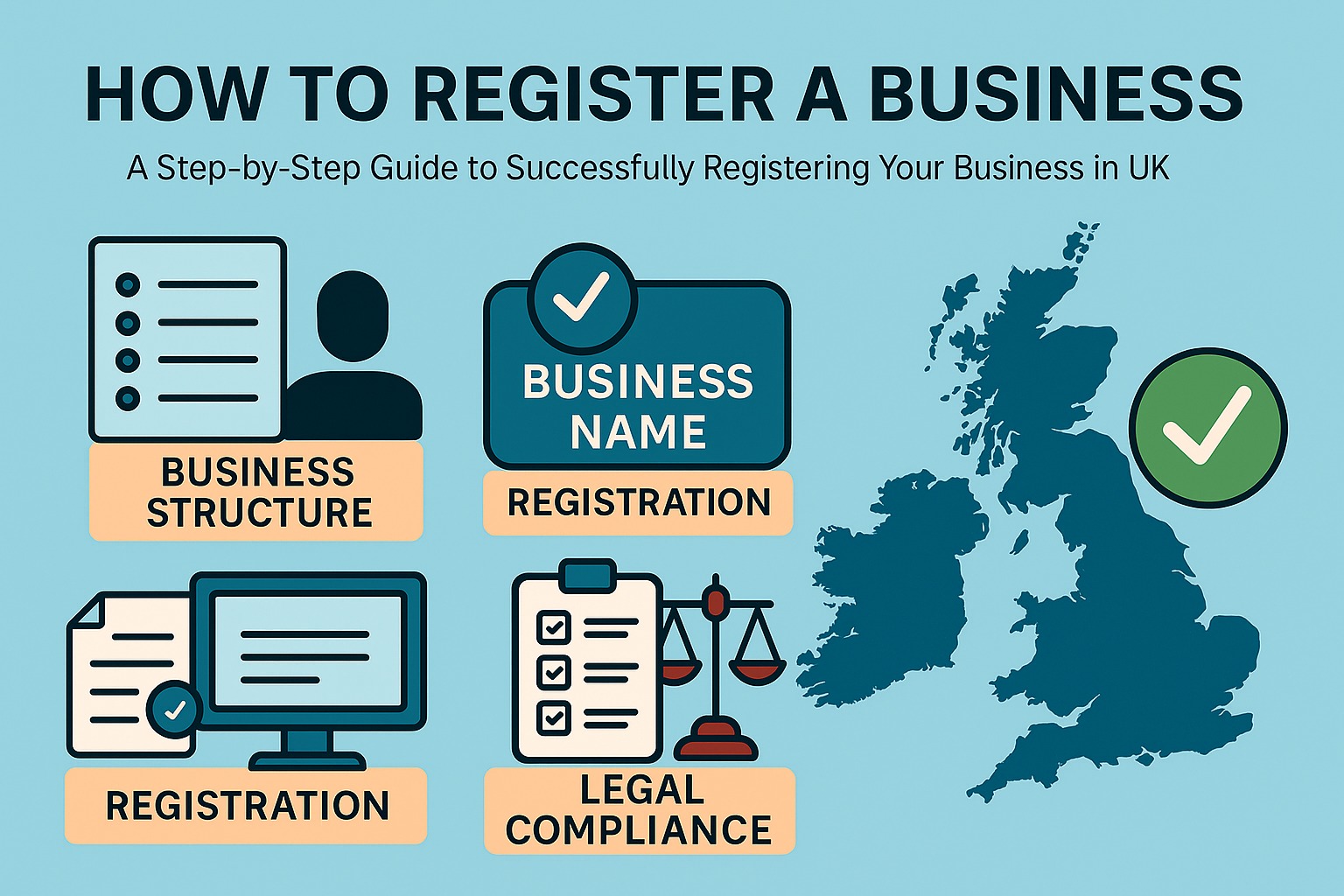How to Register a Business: A Complete Guide for Entrepreneurs
A Step-by-Step Guide to Successfully Registering Your Business in the UK

Starting a business is an exciting venture, but understanding the registration process is crucial for ensuring your business is legally recognized. Whether you’re setting up as a sole trader or forming a limited company, registering your business is a necessary first step. In this guide, we will explore how to register a business in the UK, covering the different business structures, the registration process, legal considerations, and the common mistakes entrepreneurs often make.
What Is Business Registration?
Business registration refers to the legal process of formally establishing your company or business with the government. In the UK, this process involves notifying the relevant authorities about your business structure, tax obligations, and ensuring compliance with various regulations. The process varies depending on the type of business you are establishing, whether it’s a sole trader, limited company, or another structure.
Business Structures & Types
Choosing the right business structure is one of the first decisions you’ll make. The business structure you choose determines your responsibilities, tax obligations, and legal protection. Here are the main types:
Sole Trader Registration
This is the simplest structure where you and your business are legally the same. You’ll need to register with HMRC for self-assessment if your income exceeds £1,000.
Limited Company Formation
A limited company is a separate legal entity, meaning it is distinct from its owners. This structure offers limited liability protection, which means your personal assets are protected in case of business debts. To register, you’ll need to provide details of your directors, shareholders, and a company name.
Limited Liability Partnership (LLP) Setup
An LLP combines elements of a partnership and a limited company. It provides limited liability to its members but allows flexibility in how profits are shared and managed. An LLP must be registered with Companies House.
Public Limited Company (PLC) Incorporation
A PLC is a company that can sell shares to the public. It requires a minimum share capital of £50,000 and must be registered with Companies House.
Other Business Structures
Additional structures include partnerships, community interest companies (CIC), micro-entities, and more. Your choice depends on your goals, whether it’s limited liability, tax efficiency, or governance flexibility.
Registration Process & Requirements
The process of registering your business will depend on its structure. Below are the steps for registering a limited company, one of the most common structures:
Registering with Companies House
-
Step 1: Choose a company name: The name must be unique and meet the legal requirements.
-
Step 2: Prepare documents: These include the Memorandum of Association, Articles of Association, and details of directors and shareholders.
-
Step 3: File Form IN01: Submit this form along with the necessary documents to Companies House.
HMRC Self-Assessment Registration
If you’re a sole trader, you must register with HMRC for self-assessment. This process is simple and ensures that you pay the correct tax on your income.
Corporation Tax Registration
Limited companies must register for Corporation Tax within three months of starting to trade. HMRC will send a letter with details once you register your company.
VAT Registration
You must register for VAT if your taxable turnover exceeds £85,000. This registration allows your business to charge VAT on sales and claim VAT on expenses.
Legal & Compliance Considerations
Once your business is registered, there are several legal and compliance steps to follow.
Business License Requirements
Some businesses require a license to operate, especially those in sectors such as food, health, and retail. Make sure to check with your local authority or governing body for your specific industry requirements.
Intellectual Property Protection
If you have a unique product or service, consider registering your intellectual property (IP), such as trademarks or patents, to protect your business from potential competitors.
Data Protection Registration (ICO)
If you process personal data, your business must be registered with the Information Commissioner’s Office (ICO) to ensure compliance with data protection laws like GDPR.
Tax Compliance
It’s crucial to stay on top of tax filing deadlines, including Corporation Tax, VAT returns, and income tax for sole traders. Non-compliance can lead to penalties.
Common Mistakes When Registering a Business
1. Free Company Registration
Some online platforms promise “free company registration.” While the registration itself might be free, other services like submitting paperwork, ensuring legal compliance, and ongoing company support often come with additional fees.
2. Instant Business Registration
Although registration can be completed quickly online, it is not “instant.” It can take anywhere from a few hours to several days, depending on the registration method.
3. Registering a Business Without an Address
A registered office address is required for all companies. This address is where official correspondence is sent and must be a physical location, not a PO Box.
In India, using a Virtual office in Mumbai from providers like Instaspaces helps meet legal registration and GST compliance requirements without leasing a full-time space.
4. Registering a Business Anonymously
While your details as a director or shareholder will be publicly available, you cannot register a business anonymously in the UK. All business owners must be identifiable.
5. No Tax Registration Required
You must register for taxes with HMRC, whether you’re a sole trader or running a limited company. Failing to do so can lead to significant fines and penalties.
6. Avoiding VAT Registration
Some small businesses try to avoid VAT registration, but if your turnover exceeds the VAT threshold, you must register for VAT, even if you don’t want to.
7. Starting a Business Without a Business Plan
It’s tempting to jump straight into business without a formal business plan. However, a business plan is essential for setting goals, securing funding, and mapping out your business’s future.
8. Unlimited Number of Business Partners
While partnerships can be formed, there is a legal limit to how many people can be involved in certain business structures, especially in an LLP.
9. Registering a Business Without a Bank Account
It’s a legal requirement to have a business bank account when operating as a limited company. A business bank account separates your personal and business finances and is essential for managing cash flow.
10. Start a Business With No Legal Requirements
There are various legal requirements to fulfill when starting a business, including tax registration, compliance with industry standards, and obtaining licenses. These must not be overlooked.
Business Planning & Strategy
Business Plan Development
Developing a business plan is one of the most important steps when starting a business. It helps you set clear objectives, define your target market, and secure funding.
Market Research for Startups
Conducting thorough market research helps you understand the industry, competitors, and customer needs. It’s an essential part of a solid business plan.
Business Model Canvas
Using a business model canvas can help map out your business structure, key partnerships, and revenue streams in one visual document.
Sales Forecasting
Sales forecasting involves predicting future sales based on historical data and market trends. It’s essential for managing cash flow and planning growth.
Financial & Tax Considerations
Business Bank Account Setup
It’s crucial to open a business bank account to keep personal and business finances separate. This simplifies bookkeeping and tax reporting.
Corporation Tax Filing
Limited companies must file a Corporation Tax return annually. Ensure all income and expenses are reported accurately to avoid penalties.
VAT Returns Submission
If registered for VAT, you will need to submit quarterly VAT returns. This ensures you are compliant and avoids fines.
FAQ
1. How much does it cost to register a business in the UK?
The cost of registering a business depends on the structure. Sole trader registration is free, while limited companies typically cost around £12 to register online.
2. Do I need a physical office to register a business?
No, you can use a registered office service for your limited company. However, the address must be a physical location and not a PO Box.
3. What is the process for registering for VAT?
You must register for VAT if your taxable turnover exceeds £85,000. You can do this online through the HMRC website.
4. How long does it take to register a business?
Registering a limited company online typically takes 24 hours. Paper registrations can take longer.
5. Can non-UK residents register a business in the UK?
Yes, non-UK residents can register a business in the UK, but they need a UK-based registered office address.
Conclusion
Registering your business is a crucial first step toward establishing your company in the UK. Whether you opt for a sole trader setup, a limited company, or another structure, understanding the registration process and legal requirements will ensure your business operates smoothly from day one.



